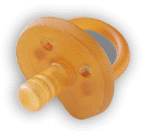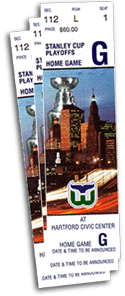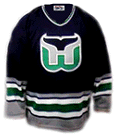- It was never easy to be a fan of the
Hartford Whalers. It was never more difficult than in 1996-97.
Here, a few of the instances in which, for me, the team reached
new highs in lows.
|
..................................................................................................................................

- But there are no diaper-changing
stations in the Civic Center.
- Brendan Shanahan is a player who loves
the limelight. Unfortunately, he found the particular shade of
light in Hartford unflattering. Traded to the Whalers in 1995,
given the opportunity to turn around and perhaps save a franchise,
anointed as the man who would restore the Whalers to legitimacy
and, hopefully, glory, Brendan Shanahan cried.
-
- With the weight of a franchise on
his shoulders, Shanahan struggled; he had five goals as 1995
wound down. By the following summer, he was very publicly demanding
to be traded. He got his wish, but not before he was forced to
play the first games of the 1996-97 season as a Whaler. The fans
were justifiably merciless in their treatment of him, booing
every time he touched the puck.
-
- General manager Jim Rutherford, trying
to limit the damage, sent Shanahan to the Red Wings in return
for center Keith Primeau, future Hall of Fame defenseman Paul
Coffey and a first-round pick -- an outstanding bit of alchemy
that gave us all hope for the future. And Primeau did not disappoint,
leading the team on and off the ice.
-
- Coffey, on the other hand, didn't
know whether or not he wanted to play. Unable to settle on a
contract with the Whalers, often injured and usually ineffective,
he too finally begged for a trade.
-
- Shanahan went on to win the Stanley
Cup in 1997, ironically enough playing against Coffey and the
Philadelphia Flyers, who seemed to vanish from the playoffs.
Let the record show that, of the first eight goals scored against
the Flyers, Paul Coffey was on the ice for six of them, and saw
another from the penalty box. He then suffered a concussion and
was not seen on the ice again in the playoffs. The Flyers went
down in four games. In the 1997-98 season, the Flyers seemed
at a loss as to what to do with him. He had two goals in 57 regular-season
games and was scratched for all five 1998 playoff games against
the Buffalo Sabres. The Flyers finally packed him off to Chicago
for a fifth-round (!) draft pick, still on the hook for $1 million
of his salary. "If a player is not going to play for you,
sometimes you have to accept paying part of the contract,"
Flyers general manager Bob Clarke said. Enjoy the Hall of Fame,
Paul, and thanks for nothing.
|
..................................................................................................................................
- The Feather trade.
- On March 5, 1997, the Whalers sent
journeyman defenseman Glen Featherstone to the Calgary Flames.
While not of the same magnitude as the trades of Mark Howe, Ron
Francis, Kevin Dineen or other franchise players, trading Feather
was sort of the final twist of the knife before the Whalers packed
it in for good. Feather wasn't a great player, but he was popular.
I liked Feather. In return, the Whalers acquired Steve Chiasson,
a great player who became a big part of the defense. In North
Carolina. Feather, meanwhile, spent the 1997-98 season with the
IHL's Indianapolis Ice.
|
 |
..................................................................................................................................

- The Games That Never
Came: playoff tickets arrived in the mail two days after the
Whalers were officially eliminated from post-season competition,
three weeks after they announced they would leave Hartford at
the end of the season.
|
- This is not what
we meant when we said "Let's Go Whalers."
- In two embarrassingly breezy press
conferences on March 26, 1997, first governor John Rowland and
then owner Peter Karmanos announced that the Whalers could not
come to agreement with the state on the terms of a new arena
deal, and therefore the Whalers would depart Connecticut at the
end of the season -- destination to be determined, but apparently
anywhere was preferable to Hartford.
-
- The heroic Rowland stood firm against
the greedy team owner. "We have to make the same case to
the public and to the legislature that this wouldn't cost taxpayers
a dime and that the revenue generated would suffice paying off
the bonds," he said. He never understood that leadership
is about vision, not about counting poll numbers. Rowland's insistence
that a new arena be "revenue-neutral" (a phrase I heard
so often I wanted to puke) meant only one thing: he was willing
to sacrifice the viability of Connecticut's capital city to his
own political aspirations. It never occured to him to sell the
new arena as a necessary public expense to revive a dying central
city; he let the debate be framed as a giveaway to a millionaire
team owner, and the polls, unsurprisingly, showed little support.
He would not tax the good people of Connecticut to build what
might have been the centerpiece of Hartford's renaissance. His
hangers-on at the press conference actually cheered and clapped,
apparently relieved that the team would be leaving town well
in advance of Rowland's 1998 re-election campaign. That applause,
perhaps, is the most shameful moment in Whalers history.
-
- Rowland, appearing on television that
night, had the temerity to say that it would be "better"
for Hartford to have a minor-league team than the Whalers. In
short order, the Connecticut Development Authority turned over
the keys to the Civic Center to the owners of the reviled New
York Rangers, who placed their AHL affiliate in Hartford and
named them the Wolf Pack. And with that, we see the final proof
of what we have always suspected: Connecticut really is New York's
doormat.
|
..................................................................................................................................
- I'm getting my franchise
together and taking it on the road.
- The Whaler faithful endured agonies
of embarrassment as owner Peter Karmanos, determined to find
a better home for his franchise, spent weeks flirting with cities
across North America. Depending on when you asked, his first
choice for relocation was Columbus, Ohio; or St. Paul, Minnesota;
or Raleigh, North Carolina. It became a running joke -- not that
we needed another one of those. A new high in low points came
with the announcement that the team was considering renovating
a 55-year-old, abandoned Ohio aircraft hangar as a temporary
home. Word began to leak that higher-ups in the NHL were unhappy
with this undecorous sort of franchise prostitution. The national
media had a field day, while fans back home cringed. It was perhaps
a final dose of ignominy that Karmanos eventually inked a deal
in Raleigh -- a deal which sounds suspiciously
inferior to the arrangement he was offered in Hartford.
|
 |
..................................................................................................................................
 |
- Farewell whale tail.
- While fending off a lawsuit by a local
attorney who had filed a trademark application to register the
name "Carolina Hurricanes," the team formerly known
as the Hartford Whalers unveiled their new logo. I was breathless
with anticipation, torn between hoping for something wonderful
and something disastrous. I think I got the latter. A graphic
representation of a hurricane, in red and black, formed by two
interlocking "C"s for Carolina. A perfectly appropriate
symbol: it looks like 25 years of Whalers history swirling down
a drain.
-
- In unveiling the new logo, Karmanos
noted that he did not want a "comic book kind of" image,
like those of Anaheim or Phoenix. It was not mentioned that Anaheim
and Phoenix are among the most successfully marketed teams in
the league. It was, however, mentioned that the team's new secondary
logo -- what is supposed to be a hurricane flag hoisted on a
hockey stick -- is actually a gale warning flag. Well, that's
the kind of mistake anyone can make. Really.
-
- One more thing. Thanks to the late
unveiling and the lawsuit, the team had no Hurricanes jersey
ready for the NHL draft June 21. Their first pick wore a generic
NHL sweater. More snickers were heard in the press. Whalers fans
did not cringe this time; the team is North Carolina's embarrassment
now.
|
|


![]()